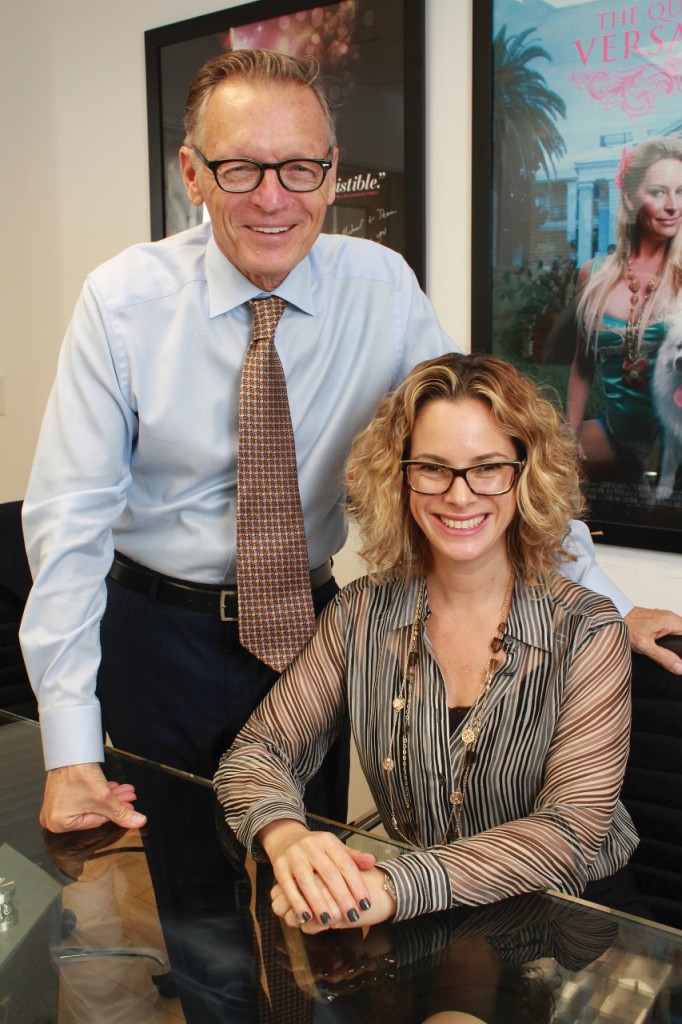In Defense of Film
Beverly Hills law firm Donaldson + Callif represents just about every independent documentary film in the business

Michael Donaldson and Lisa Callif are principle partners at Donaldson + Callif. Photo by David Rosenfeld
Since attorney Michael Donaldson first started representing documentary films more than 30 years ago, the popularity of the genre has skyrocketed. Distribution costs bottomed out as high-tech equipment became more affordable. A lot has changed, though Donaldson’s presence as a preeminent attorney for filmmakers has not.
The Santa Monica resident and his business partner since 2008, Lisa Callif, together with three other attorneys make up the Beverly Hills law firm Donaldson + Callif. The firm represents nearly every independent documentary filmmaker today such as Morgan Neville of Tremolo Productions, who earlier this month won an Oscar for 20 feet from Stardom, a film about backup singers.
“What they are doing for documentary filmmakers is revolutionary and much needed,” Neville said.
What Donaldson + Callif are doing basically is finding insurance companies to back these films, which use copyrighted video clips without permission from the rights holder. This “fair use” of material is a sort of compromise between the First Amendment protecting free speech and copyright law, which establishes a monopoly for the originator of the material. In addition to documentaries, they also to a lesser extent represent feature films.
Not only are they the foremost attorneys in the field, they are also among the only ones.
“If we can’t take a client I don’t even know who else to refer them to,” Callif said. “I don’t think anyone does this to the extent we do, in terms of the depth we go for clearances and how many documentary filmmakers we represent. We’re in a league of our own.”
The pair coauthored a legal guide for the American Bar Association about filmmaking and Donaldson is the author of the textbook Clearance & Copyright used in more than 50 colleges and universities throughout the country. How he became an authority on the subject began with a simple interest in movies as a young man.
“All my life I have believed strongly that you ought to do what you love,” he said. “For me, I love independent films, especially documentaries. So when you do what you love and help the people you admire, they will come back and work with you, just as night follows day. It’s a natural consequence. Every religion says that, what goes around comes around. What you put out you get back.”
Much of journalism, especially TV reporting, has been corrupted by the pressure of profit and deadline, Donaldson argues, noting there’s an especially urgent need for documentaries with such persistent misreporting by major media outlets like CNN.
“It’s the documentary film world that has taken over the job of truth-telling, the job of seriously in-depth investigative reporting,” he said. “Today, the important investigative journalism is done by documentary filmmakers. Newspapers can’t afford it. TV doesn’t have the time and radio never cared.”
Donaldson + Callif’s clients include the makers of 16 films nominated this year for awards at the Sundance Film Festival. Previous clients include the makers of Blackfish, which depicted the life of killer whales at SeaWorld and Gasland, which exposed the controversial method of fracking as a consequence of drilling for natural gas and oil.
“These films really look at a subject over time, in-depth and without the pressure of a hierarchy, of a boss saying, ‘When’s that going to be done?’ Donaldson said.
Independent documentary filmmakers don’t typically have a large budget to hire attorneys and Donaldson’s firm makes its money from the sheer volume of films it represents. Donaldson said his firm may ask a filmmaker to adjust the length of time a certain copyrighted clip is used, or make other changes. The lawyers then pair the film with an insurance company providing omissions and errors insurance. That can sometimes take a lot of convincing. Donaldson famously penned an opinion letter that successfully earned an insurance policy for Escape from Tomorrow, a feature film shot surreptitiously on Disney World property. The opinion reportedly took four months to complete.
Having omissions and errors insurance means that if someone claims a clip in the film is not ‘fair use’ and sues, the insurance company steps in to defend the filmmaker. This protection also extends to claims of defamation and privacy.

The team at Donaldson + Callif includes Michael Donaldson, Dean Cheley, Christopher Perez, Marisa Kapust and Lisa Callif. Photo by David Rosenfeld
Although the New York Attorney General released the youths, the city insisted the young men might still be involved in the crime and demanded the outtakes from the film. When the city of New York made this demand, Donaldson appeared in court to represent the filmmakers, which included Burns, his daughter Sarah and her husband David McMahon.
“The reason we entered the fray, and we enter the fray from time to time, is there was an issue that affected all documentary filmmakers,” Donaldson said. “And in this case they are journalists and their files are protected under the journalistic privilege.”
The judge agreed. The city never received any outtakes from the film. And the youths have a lawsuit pending against the city of New York.
Donaldson also petitioned the Supreme Court on behalf of filmmaker Robert Stevens who made a movie about the history of pit bulls and included a clip of dogs fighting in Japan, where the activity is legal. Stevens was sentenced to three years in prison for violating a federal law that prohibits showing cruelty to animals in movies. Donaldson argued that the First Amendment protected the film clip and the Supreme Court agreed with an 8-1 ruling.
“I don’t like harm to animals either. But Congress passed a law that was pushed through by PETA that was draconian,” Donaldson said. “This man received a prison sentence that was more than Michael Vick. That’s crazy. That’s not right. So we didn’t have a problem at all jumping into that case.”
Documentaries have the potential to change reality and the ability to use virtually any video clip a filmmaker wants, promotes creativity, they argue.
Callif, who joined the firm six years ago, was recognized as one of the best and brightest in entertainment law by Variety magazine in 2010. Recently she was tasked with sorting out the legal issues around the film I’m Still Here, which follows Joaquin Phoenix through an apparent drug binge as he quits acting to pursue a rap career. The film began as a publicity stunt by Phoenix and friend Casey Affleck before they decided to use the footage in a commercial film. That’s when they brought Callif into what would seem a nightmare scenario for an attorney.
“It wasn’t the worst nightmare,” Callif said. “Their personal lawyers called me in to help out on issues related to clearance and confusing or misleading the public. There were a lot of issues involved but they were manageable. It was hard because internally in their camp they weren’t sure about whether it was fiction or non-fiction and disclosing exactly what was happening.”
It wasn’t until Affleck announced publicly the film was a hoax that Callif even knew the truth.
“The medium of documentary storytelling has really come a long way, in part because of fair use and the ability to use clips and really tell the story they want to tell,” Callif said. “It enables filmmakers to think outside the box.”
“We’re the luckiest lawyers in town,” Donaldson said. “We have a fun practice. We help emerging filmmakers, and they’re appreciative. We’re appreciative they come in the office at all. I can’t think of a more fun way to practice law than to help young filmmakers achieve their dreams.”
To view full article please visit: [ westsidepeoplemag.com ]